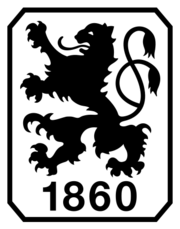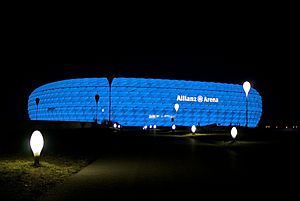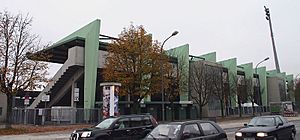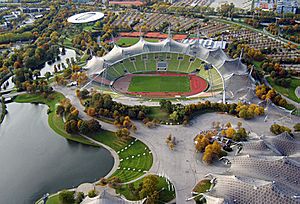TSV 1860 Munich facts for kids
 |
||||
| Full name | Turn- und Sportverein von 1860 | |||
|---|---|---|---|---|
| Nickname(s) | Die Löwen (The Lions) Sechzig (Sixty) Die Sechzger (The Sixties) Weiß und Blau (White and Blue) Die Blauen (The Blues) |
|||
| Founded | 17 May 1860, football on 6 March 1899 |
|||
| Ground | Allianz Arena (2005-2017) Grünwalder Stadion (1911–1995, 2004–2005, 2017–present) |
|||
| Capacity | 15,000 | |||
| Owner | HAM International Limited (60%) TSV München e.V. (40%) |
|||
| President | Robert Reisinger | |||
| Head coach | Patrick Glöckner | |||
| League | 3. Liga | |||
| 2020–21 | 3. Liga, 4th of 20 | |||
|
||||
Turn- und Sportverein München von 1860, often called TSV 1860 München or 1860 Munich, is a sports club from Munich, Germany. Their main team plays football in the 3. Liga, which is the third highest league in German football. They play their home games at the Grünwalder Stadion, a place they have called home for most of their history since 1911.
The club started in 1860, and its football team was formed in 1899. 1860 Munich became a strong team in the 1920s and 1930s. They won the German Cup (then called the Tschammerpokal) in 1942. Unlike their city rivals Bayern Munich, 1860 Munich was one of the first teams in the Bundesliga when it began in 1963. This started a very successful time for them. They won the German Cup again in 1964 and the Bundesliga league title in 1966. They also finished second in the league in 1967.
Since the 1970s, the club has faced challenges like being moved to lower leagues and having money problems. They even played in amateur leagues in 1982. In 2017, they had a big financial crisis. However, they made a comeback in the 1990s, returning to the Bundesliga. They finished fourth in 2000 and played in European competitions. After more money troubles and being moved down a league in 2017, they managed to get promoted back to the 3. Liga the very next season.
1860 Munich is known as Die Löwen (The Lions) and Die Blauen (The Blues). This is because they have mostly worn sky-blue uniforms. Their biggest rival is Bayern Munich, and their games are called the Munich derby. Both clubs used to share the Grünwalder Stadion. In 2005, they both moved to the new Allianz Arena. But after 1860 Munich was moved to a lower league in 2017, they returned to their old home, the Grünwalder Stadion.
Contents
Club History
How the Club Started
The club began as a gymnastics and fitness group. People met on July 15, 1848, in a local pub. This was a time of big changes in Germany, and the club was banned in 1849 by the Bavarian king because of its "republican activities." The club officially started again on May 17, 1860. After joining with other local groups in 1862, it became known as Turnverein München.
The football part of the club was created on March 6, 1899. They played their first games against other teams three years later. On March 13, 1880, the club officially added a lion to their badge and got the nickname Die Löwen (the Lions).
Early Success (1900–1945)
In 1919, the club changed its name to TSV München 1860. By the mid-1920s, they were playing in Germany's top football leagues. They reached the national semi-finals in 1927. Die Löwen almost won the championship in 1931 but lost 3–2 to Hertha BSC. Two years later, they reached another semi-final, losing to Schalke 04.
In 1933, German football was reorganized into 16 top divisions called Gauligen. TSV joined the Gauliga Bayern. They finished second in 1934, 1938, and 1939. They finally won a division championship in 1941. The next season, they won their first major trophy, beating Schalke 04 to win the Tschammerpokal, which is now known as the DFB-Pokal (German Cup).
Post-War Era and Golden Years
After World War II, 1860 played in the top league, Oberliga Süd. They were usually a mid-table team but were moved to a lower league in 1956. They returned to the Oberliga Süd in 1957 and won the league championship in 1963.
By winning, 1860 automatically joined Germany's new professional league, the Bundesliga. They joined before their rivals Bayern Munich, who had to wait two seasons. The German Football Association (DFB) did not want two teams from the same city in the new league right away. In the mid-1960s, 1860 won their second DFB-Pokal in 1964. They also played in the European Cup Winners' Cup final in 1965, losing 2–0 to West Ham United. In 1966, they became Bundesliga champions. They then played in the 1966–67 European Cup, losing to Real Madrid. On June 3, 1967, they finished second in the Bundesliga.
Challenges and Comebacks (1970s–Present)
After their successful period, 1860 Munich had some tough years. They were moved to a lower league in 1970. It took them seven years to get back to the top division, but they were immediately moved down again. They returned for two more years, then in 1982, they were moved down again. Financial problems even caused them to play in the third-tier amateur league.
The club was promoted back to the Bundesliga for the 1994-95 season. They managed to stay in the league. The club's leaders brought in new players like Olaf Bodden, Harald Cerny, Daniel Borimirov, Peter Nowak, Jens Jeremies, and Manfred Schwabl. Other famous players like Abedi Pele, Thomas Häßler, and Davor Šuker also joined the team.
In 2000, 1860 finished fourth in the Bundesliga. This meant they could play in the UEFA Champions League qualifying rounds. They lost to Leeds United and then played in the UEFA Cup, reaching the third round.
After ten years in the top league, 1860 finished 17th in the 2003–04 season and moved back to the 2. Bundesliga. The club made a decision to share the Allianz Arena stadium with rivals Bayern Munich. This decision made many fans upset. The club faced serious money problems in 2005–06. Bayern Munich bought 1860's share of the Allianz Arena in 2006, which helped the club financially.
Over the years, 1860 hired several new managers, but none could lead the team back to the top Bundesliga league. In 2011, the club almost went bankrupt again. They needed €8 million to survive. A Jordanian investor named Hasan Abdullah Ismaik helped the club by buying 60% of the club's professional team.
In the 2014–15 season, the team finished 16th in the 2. Bundesliga. They had to play a special game to stay in the league against Holstein Kiel. They won 2–1 at home after a 0–0 draw in the first game, thanks to a late goal by Kai Bülow.
In 2016–17, the team finished 16th again. They lost their relegation play-off games against Jahn Regensburg and were officially moved down. On June 2, 2017, it was announced that 1860 could not get a license for the 3. Liga because the investor, Hasan Ismaik, did not want to pay the fees. So, the club was moved down to the Regionalliga Bayern (fourth tier) for the 2017–18 season.
They only spent one season in the Regionalliga. They won the league in 2017–18, which meant they returned to the 3. Liga. In their first season back, they finished 12th. The team reached 4th place in the 2020–21 and 2021–22 seasons. This was just one spot away from the promotion play-offs. They also qualified for the 2021–22 DFB-Pokal and 2022–23 DFB-Pokal cup competitions.
Reserve Team
The TSV 1860 Munich second team, also known as the TSV 1860 Munich Amateurs until 2005, has had a good history in Bavarian football.
The second team faced challenges when the main club was not in professional football. But they improved after the main club's comeback in the early 1990s. They returned to the Bayernliga in 1996 and won the title in their first season, moving up to the third-tier Regionalliga Süd. The team was moved down to the Bayernliga in 2001 but returned to the Regionalliga Süd in 2004.
TSV 1860 Munich II almost qualified for the 3. Liga in 2007–08 and again in 2012–13. In 2012–13, they won the new Regionalliga Bayern but lost to SV Elversberg in the promotion round. Because the first team was moved to Regionalliga Bayern for the 2017–18 season, the reserve team was moved down to the fifth-tier Bayernliga Süd.
1860 Munich is the only club in Bavaria to have won the Bayernliga with both its first and second teams.
Home Stadiums

Originally, 1860 Munich played their home games at the Stadion an der Grünwalderstraße, often called Sechzgerstadion. This stadium was built in 1911. They shared it with city rivals Bayern Munich from 1925 to 1972. Both clubs then moved to the new Olympiastadion, which was built for the 1972 Olympic Games. 1860 Munich moved back to the old Grünwalder Stadion several times after 1972, with the longest period being from 1982 to 1995. In the 2004–05 season, 1860 played at Sechzger again while the Allianz Arena was being prepared.
From 2005 to 2017, 1860 Munich played their home games in the Allianz Arena. They shared this stadium with Bayern Munich and even co-owned it until 2006. The stadium's usual peach lights would change to 1860's blue when their team played. The club's first game at the Allianz Arena was a friendly match against 1. FC Nürnberg on May 30, 2005. On April 28, 2006, 1860 sold its 50% share to Bayern Munich to help with a serious financial crisis. On July 12, 2017, Bayern Munich ended 1860 Munich's rental agreement for Allianz Arena. The club then returned to their old stadium, the Grünwalder Stadion.
Club Honours
League Titles
- German Championship/Bundesliga
- Champions: 1965–66
- Runners-up: 1931, 1966–67
- Oberliga Süd (Top League before Bundesliga)
- Champions: 1962–63
- Gauliga Bayern (Top League during WWII)
- Champions: 1940–41, 1942–43
- 2. Bundesliga (Second Division)
- Champions: 1979
- Runners-up: 1977
- Bayernliga (Third Division)
- Champions: 1984, 1990–91, 1993
- Runners-up: 1986, 1990
- Regionalliga Bayern (Fourth Division)
- Champions: 2017–18
Cup Wins
- German Cup
- Winner: 1942, 1963–64
- Bavarian Cup
- Winner: 2020
International Competitions
- European Cup Winners' Cup
- Runners-up: 1964–65
Youth Team Honours
- German Under 17 championship
- Champions: 2006
- German Under 19 Cup
- Winners: 2000, 2007
- Bavarian Under 19 championship
- Winners: 1963, 1982, 1983, 1988, 1998‡
- Bavarian Under 17 championship
- Winners: 1975, 1980, 1984
- Bavarian Under 15 championship
- Winners: 1979, 1980, 1997, 1998, 2012
Reserve Team Honours
- Regionalliga Bayern (Fourth Division)
- Champions: 2012–13
- Bayernliga (Fourth Division)
- Champions: 1997, 2004
Current Players
|
|
TSV 1860 Munich II squad
Coaches
 Fred Spiksley (1912–14)
Fred Spiksley (1912–14) Max Breunig (1926–28)
Max Breunig (1926–28) Richard Kohn (1928–30)
Richard Kohn (1928–30)
 Max Breunig (1930–37)
Max Breunig (1930–37) Max Schäfer (1937–38)
Max Schäfer (1937–38) Dietrich Tillmann (1938–39)
Dietrich Tillmann (1938–39) Otto Eckhardt (1939–40)
Otto Eckhardt (1939–40) Franz Schmeifler (1940–41)
Franz Schmeifler (1940–41) Max Schäfer (1941–45)
Max Schäfer (1941–45) Ludwig Goldbrunner (1945–46)
Ludwig Goldbrunner (1945–46) Georg Ertl (1946–47)
Georg Ertl (1946–47)
 Max Schäfer (1947–51)
Max Schäfer (1947–51) Josef Molzer (1951–52)
Josef Molzer (1951–52) Fred Harthaus (1952–55)
Fred Harthaus (1952–55) Max Schäfer (1955–56)
Max Schäfer (1955–56) Hans Hipp (1956–61)
Hans Hipp (1956–61) Max Merkel (1961–66)
Max Merkel (1961–66) Hans-Wolfgang Weber (1966–67)
Hans-Wolfgang Weber (1966–67) Gunter Baumann (1967)
Gunter Baumann (1967) Albert Sing (1967–68)
Albert Sing (1967–68) Hans Pilz (1968–69)
Hans Pilz (1968–69) Fritz Langner (1969)
Fritz Langner (1969) Franz Binder (1969–70)
Franz Binder (1969–70) Hans Tilkowski (1970–72)
Hans Tilkowski (1970–72) Elek Schwartz (1972–73)
Elek Schwartz (1972–73) Rudi Gutendorf (1973–74)
Rudi Gutendorf (1973–74) Max Merkel (1974–75)
Max Merkel (1974–75) Heinz Lucas (1975–78)
Heinz Lucas (1975–78) Eckhard Krautzun (1978–79)
Eckhard Krautzun (1978–79) Alfred Baumann (1979)
Alfred Baumann (1979) Carl-Heinz Rühl (1979–81)
Carl-Heinz Rühl (1979–81) Wenzel Halama (1981–82)
Wenzel Halama (1981–82) Willibert Kremer (1982)
Willibert Kremer (1982) Kurt Schwarzhuber (1982)
Kurt Schwarzhuber (1982) Erich Beer (1983)
Erich Beer (1983) Bernd Patzke (1983–84)
Bernd Patzke (1983–84) Octavian Popescu (1984)
Octavian Popescu (1984) Erich Beer (1984)
Erich Beer (1984) Wenzel Halama (1984–86)
Wenzel Halama (1984–86) Dieter Kurz (1986)
Dieter Kurz (1986) Fahrudin Jusufi (1986–87)
Fahrudin Jusufi (1986–87) Thomas Zander (1987)
Thomas Zander (1987) Uwe Klimaschewski (1987–88)
Uwe Klimaschewski (1987–88) Willi Bierofka (1988–90)
Willi Bierofka (1988–90) Karsten Wettberg (1990–92)
Karsten Wettberg (1990–92) Werner Lorant (1992–01)
Werner Lorant (1992–01) Peter Pacult (2001–03)
Peter Pacult (2001–03) Falko Götz (2003–04)
Falko Götz (2003–04) Gerald Vanenburg (2004)
Gerald Vanenburg (2004) Rudolf Bommer (2004)
Rudolf Bommer (2004) Reiner Maurer (2004–06)
Reiner Maurer (2004–06) Bernhard Trares (2006)
Bernhard Trares (2006) Walter Schachner (2006–07)
Walter Schachner (2006–07) Marco Kurz (2007–09)
Marco Kurz (2007–09) Uwe Wolf (2009)
Uwe Wolf (2009) Ewald Lienen (2009–10)
Ewald Lienen (2009–10) Reiner Maurer (2010–12)
Reiner Maurer (2010–12) Alexander Schmidt (2012–13)
Alexander Schmidt (2012–13) Friedhelm Funkel (2013–14)
Friedhelm Funkel (2013–14) Markus von Ahlen (2014)
Markus von Ahlen (2014) Ricardo Moniz (2014)
Ricardo Moniz (2014) Markus von Ahlen (2014–15)
Markus von Ahlen (2014–15) Torsten Fröhling (2015)
Torsten Fröhling (2015) Benno Möhlmann (2015–16)
Benno Möhlmann (2015–16) Daniel Bierofka (2016)
Daniel Bierofka (2016) Kosta Runjaić (2016)
Kosta Runjaić (2016) Daniel Bierofka (2016)
Daniel Bierofka (2016) Vítor Pereira (2017)
Vítor Pereira (2017) Daniel Bierofka (2017–2019)
Daniel Bierofka (2017–2019) Oliver Beer (2019)
Oliver Beer (2019) Michael Köllner (2019–2023)
Michael Köllner (2019–2023) Günther Gorenzel (2023)
Günther Gorenzel (2023) Maurizio Jacobacci (2023)
Maurizio Jacobacci (2023) Frank Schmöller (2023–2024)
Frank Schmöller (2023–2024) Argiris Giannikis (2024–2025)
Argiris Giannikis (2024–2025) Patrick Glöckner (2024–)
Patrick Glöckner (2024–)
Sponsorship History
| Year | Kit Manufacturer | Sponsor | Industry |
|---|---|---|---|
| 1963–73 | Adidas | no sponsor | |
| 1973–76 | Frucade | Drinks | |
| 1976–79 | Puma | ||
| 1979–81 | Doppeldusch | Skin Care | |
| 1981–83 | Hedos | Clothing | |
| 1983–86 | Vereinigte | Insurance | |
| 1986–89 | Löwenbräu | Brewery | |
| 1989–90 | Karnehm | Furniture | |
| 1990–91 | Hacker-Pschorr | Brewery | |
| 1991–93 | Lancia | Automobile | |
| 1993–94 | Lotto | Ha-Ra | Cleaning |
| 1994–95 | Löwenbräu | Brewery | |
| 1995–99 | Nike | ||
| 1999–02 | FTI | Tourism | |
| 2002–05 | Liqui Moly | Motor Oil | |
| 2005–06 | Festina | Watches | |
| 2006–07 | Kappa | bwin | Sports Betting |
| 2007–08 | trenkwalder | Personal Services | |
| 2008–09 | Erima | ||
| 2009–10 | Liqui Moly | Lubricants | |
| 2010–11 | Comarch | Software | |
| 2011–13 | Uhlsport | Aston Martin | Automobile |
| 2013–15 | Volkswagen | Automobile | |
| 2015–16 | Macron | ||
| 2016–20 | Die Bayerische | Insurance | |
| 2020–25 | Nike | ||
| 2025– | Joma | ||
See also
 In Spanish: TSV 1860 Múnich para niños
In Spanish: TSV 1860 Múnich para niños
 | Emma Amos |
 | Edward Mitchell Bannister |
 | Larry D. Alexander |
 | Ernie Barnes |



